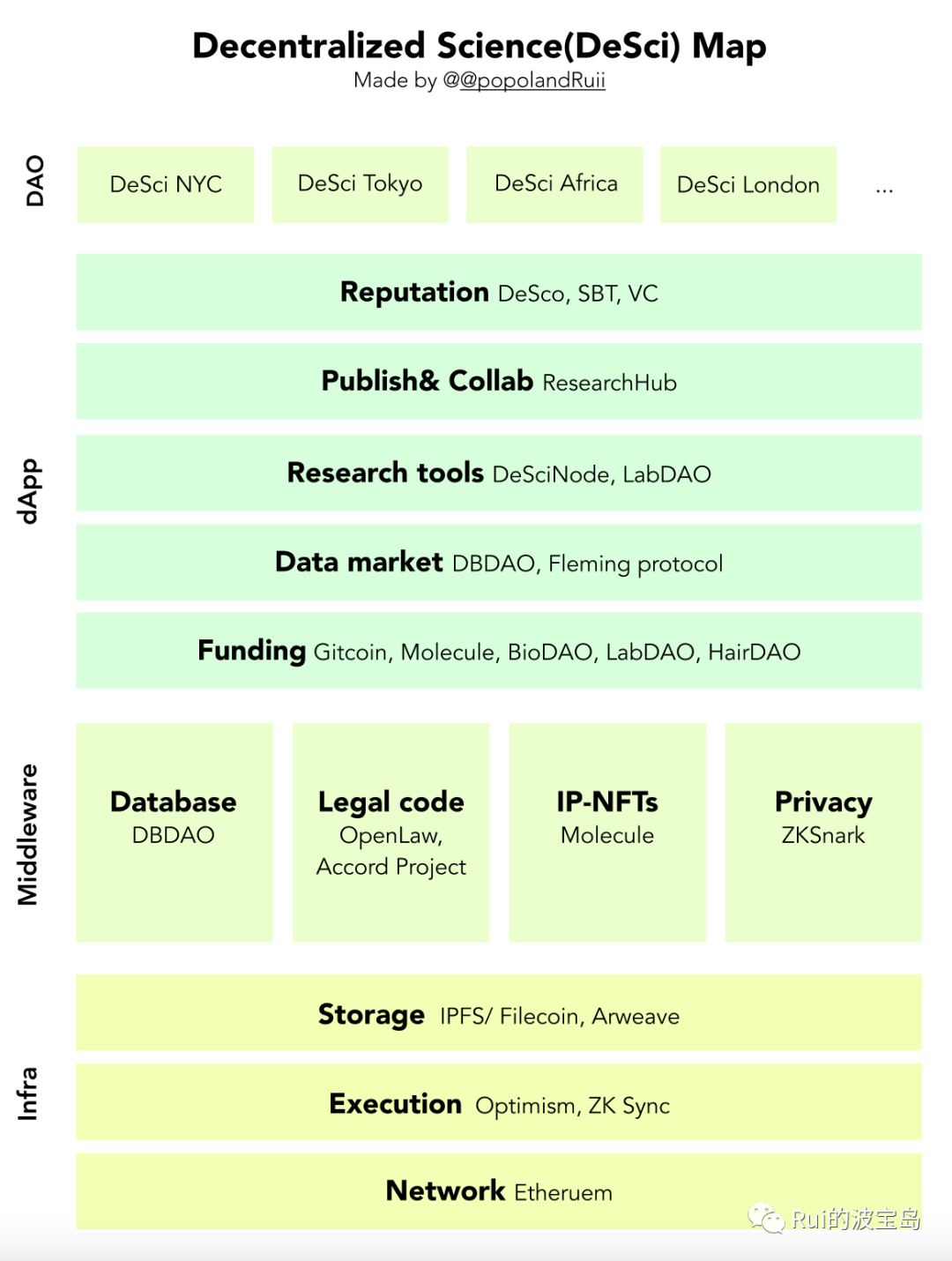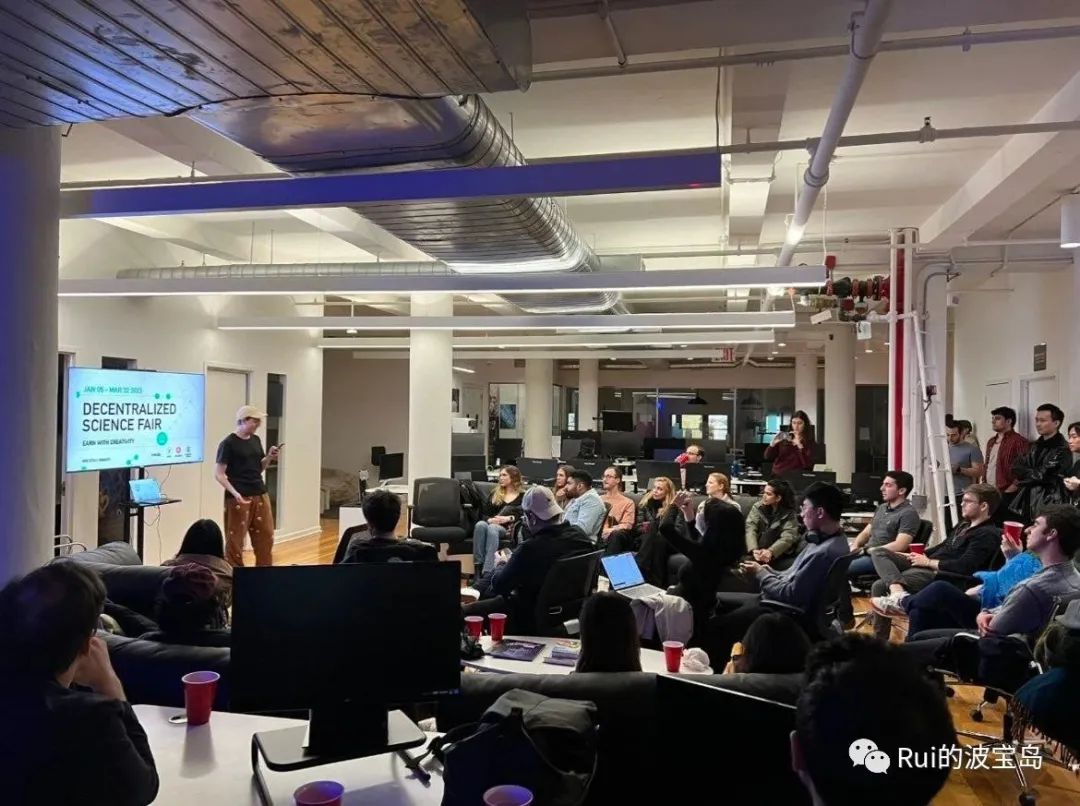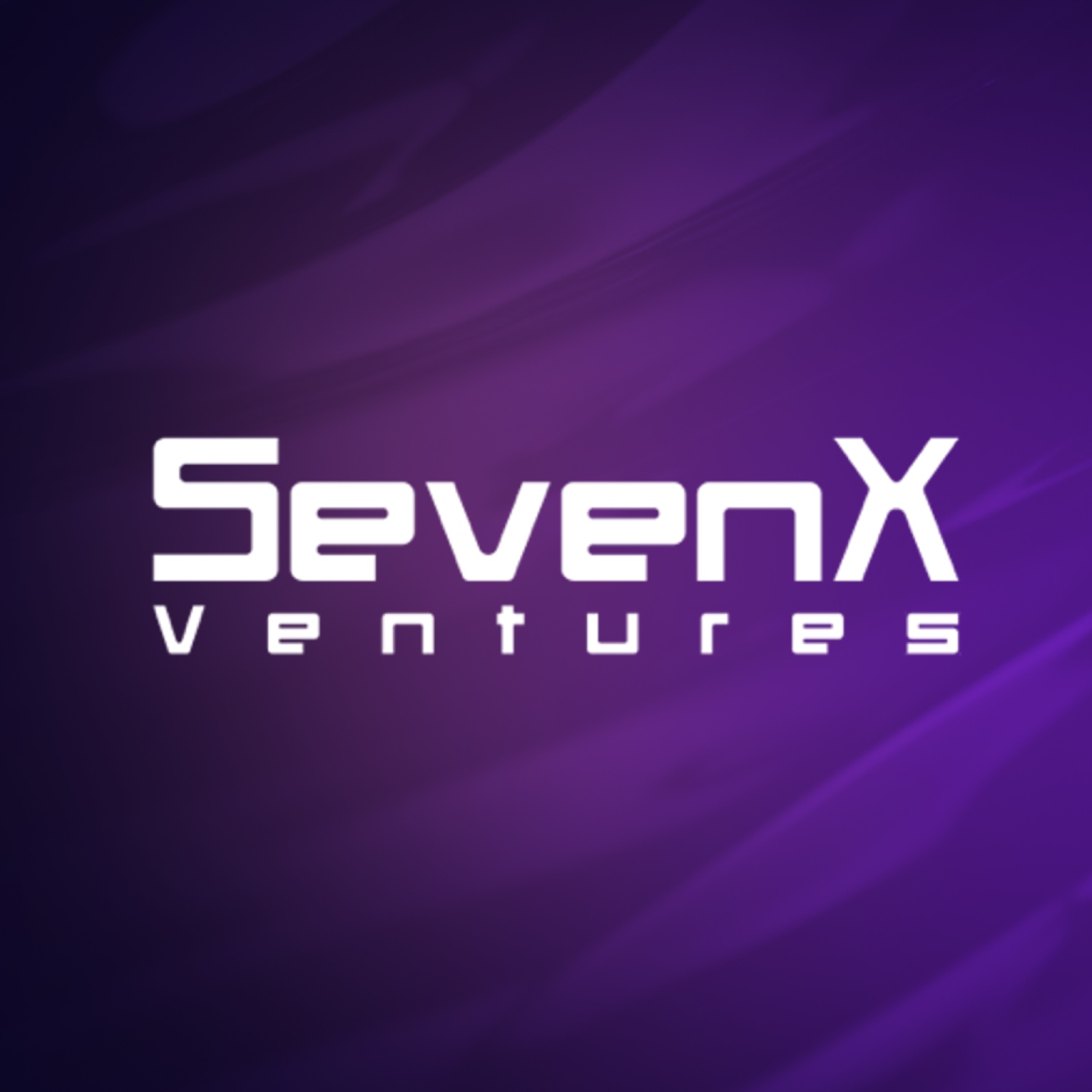DeSci: How Blockchain Disrupts the Scientific Landscape
This article is an original work by the SevenX research team, intended for communication and learning purposes only, and does not constitute any investment advice. Please cite the source if you wish to reference it.
The original English report was first published in April 2023, author: Rui

At the end of 2022, I co-founded the DeSci NYC community, which regularly holds gatherings in New York covering topics from AI-driven mycology and bee neuroscience to blockchain technology. I gradually realized that decentralized science (DeSci) is a novel concept for people in any field. This article will cover my understanding of the DeSci framework, the most core DeSci projects internationally, and future development trends.
Table of Contents:
? Challenges Facing Traditional Scientific Research
? An Urgent Call for Decentralized Science (DeSci)
⛓️ Infrastructure: Ethereum, Scaling L2, Storage
⚙️ Middleware: IP-NFT, Legal, Database, ZKP
?️ Applications: Funding, Data Market, Research Tools, Publishing, Reputation Systems
? Community: DeSci NYC, DeSci Berlin, DeSci Tokyo, etc.
✨ My Perspective on Future Challenges and Opportunities
?⬛ Conclusion
Challenges Facing Traditional Scientific Research
For a long time, scientific research has been the cornerstone of innovation, driving progress across a wide range of fields. However, traditional research has been plagued by many challenges:
- High barriers to entry: People outside academic institutions may find it difficult to participate in scientific research.
- Low data transparency and reproducibility: Researchers struggle to build upon existing work or verify published results.
- Concentrated funding: The top 10 research funders accounted for 44% of all funding before 2019.
- Peer review bias: It may be influenced by biases, especially from well-known researchers or institutions.
- Publication control: Researchers face high barriers and must pay substantial fees (often five-figure sums) to publish their work in top journals.
An Urgent Call for DeSci
As the limitations of the traditional scientific "ivory tower" become increasingly apparent, the urgency for DeSci solutions grows. DeSci enables scientists to access resources, share data, obtain funding, conduct peer reviews, and publish research in a transparent and collaborative manner. This groundbreaking alternative to traditional methods is paving the way for a more accessible, decentralized, and inclusive scientific community.
I will begin the DeSci journey according to the following structure:

Infrastructure
DeSci projects are typically built on the Ethereum blockchain, allowing people to develop applications, conduct transactions, and utilize storage. To optimize performance and minimize costs, scaling solutions such as Optimistic Rollups (OP) and zkSync are often employed, handling off-chain transactions and periodically submitting aggregated results to the Ethereum main chain. Additionally, storage protocols like Arweave provide unstructured data or file storage, outperforming traditional web2 storage in terms of security, reliability, and censorship resistance. Most DeSci projects are built on this robust infrastructure.
* If you are not familiar with blockchain infrastructure, please visit the Ethereum Foundation's official website.
Middleware
Database: Structured Data Formats
There is a desire for a low-cost, efficient decentralized storage solution for structured data such as graphs or tables. Due to the lack of such solutions, developers are currently forced to rely on centralized solutions, ultimately leading to single points of failure, accessibility, and management issues.
DBDAO is an innovative database structure that turns each row of data into an NFT, allowing contributors to share in the profits when the database is monetized. Furthermore, DBDAO transforms each database into a DAO, enabling administrators to effectively manage access and review controls. As it evolves, we can see the interesting potential of using ZK (zero-knowledge) technology to protect data while ensuring that buyers recognize the value of the database.

Legal Terms: Agreements in Smart Contracts
By incorporating legally binding agreements into the smart contracts of NFTs, parties can safeguard their interests and comply with applicable laws and regulations. To facilitate access, these legal agreements should be understandable by both legal professionals and blockchain engineers.
OpenLaw is building a tech stack to support smart legal agreements using tagged legal templates. This approach may benefit those who prefer a more traditional contract creation process, but it may lack customization.

Ownership: IP-NFT
Establishing and regulating ownership of intellectual property (IP) is crucial in the scientific field. This can be achieved through NFTs, which are digital assets on the blockchain that create a dynamic IP market by increasing asset liquidity. This allows IP owners to sell or partition their intellectual property with different entities while ensuring they receive a fair share of secondary market royalties.
Molecule has released its standard IP-NFT, which serves as a unique identifier for verifying IP asset ownership and authenticity, capable of being embedded in legal agreements, customizing smart contract functions, and fragmenting ownership. Technically, the metadata is stored on Arweave, while the IP and licenses are stored on Nevermind (a centralized data storage), ideally, they should use a decentralized data storage layer (but currently, there are no mature options).

Privacy: Zero-Knowledge Proofs
When we talk about the importance of open-source, we should also emphasize privacy controls in research. DeSci should strike a balance between promoting transparency and collaboration and ensuring data confidentiality.
Zero-Knowledge Proofs (ZKP) have emerged as a cryptographic technology that is crucial for decentralized scientific research. They can protect privacy, allowing researchers to learn from each other without compromising data confidentiality, and help researchers comply with privacy regulations.

Application Layer
Funding
Decentralized funding structured as DAOs has become a revolutionary way for individuals and organizations to directly fund projects they trust. It eliminates intermediaries and provides greater transparency, allowing contributors to see how their funds are used and to participate in decision-making processes.
The most well-known web3 fundraising platform, Gitcoin, was founded in 2017 to support open-source projects through bounties and profit from them. The platform is based on quadratic funding, a new mechanism for democratically distributing charitable funds that allows smaller contributors to have a larger impact on returns. To date, Gitcoin Grants has raised over $500,000.

Molecule is a popular DeSci funding platform focused on biopharmaceuticals, providing a protocol for creating hybrid legal smart contracts with original IP-NFTs that connect researchers and funders. It currently hosts over 250 research projects and has 6 Bio DAOs. Valley DAO also employs a similar approach.

Bio.xyz provides a launchpad, resources, guidance, shared networks, and a set of legal and smart contracts for DeSci DAOs. Their goal is to enable DeSci DAOs to utilize IP-NFTs to fund, manage, and develop intellectual property, thereby facilitating a Cambrian explosion of digital IP assets. There are currently 6 DAOs in the ecosystem.

There are many interesting niche DAOs. VitaDAO focuses on longevity research and has established a complete token incentive mechanism. HairDAO is for hair loss treatment research; AthenaDAO contributes to women's health; PsyDAO provides small grants for early research on psychedelics; CryoDAO funds the field of cryopreservation, advancing cutting-edge medical technologies; FrontierDAO focuses on space, fusion energy, and the development of a space metaverse.
Data Market
Due to limited and expensive data resources, many researchers face challenges, primarily because Web2 companies tightly guard their data. Imagine the potential of an open data market, a bold idea: individuals could profit from their data while allowing researchers to improve access, facilitate collaboration, and enable cross-platform communication.
As mentioned above, DBDAO is an innovative database structure whose core idea is to enable people to monetize their data. In my view, DBDAO is not just a database structure; it represents a significant shift in the traditional data contribution model, as it prevents researchers from having to prepay for data before monetizing or funding, while also ensuring the expected returns for data contributors through code.

Fleming Protocol is an open-source data economy aimed at driving collaborative biomedicine by incentivizing patients, focusing primarily on health data ownership. They provide patients with the infrastructure to store data on IPFS, ensuring they maintain complete custody and control. Additionally, it enables patient users to monetize their data, allowing them to directly receive the benefits of data monetization, with a portion of transaction fees contributing to the FlemingDAO treasury.

Research Tools
Research often involves various formats, such as reports, charts, code, and external APIs. We need a multifunctional decentralized platform to seamlessly link the research process and achieve dynamic research publishing.
DeSci Node is a very interesting application that allows researchers to link tables and figures in manuscripts with data and code, creating a dynamic, interoperable version history that enhances the research process. The beta version was released on February 21, 2023, and nodes are now stored in an open state repository on IPFS. Their future roadmap includes integrating computation for seamless publishing and linking funding with Gitcoin and Hypercerts.

LabDAO is a new research organization that not only allows you to publish under license and obtain funding but also provides access to research tools. These tools range from notebooks for small molecule docking to computational infrastructure and wet lab access.

Publishing Platforms
No longer is it a choice between publishing or disappearing. Traditional scientific publications and their peer review systems heavily rely on a few major industry players who control most journals, databases, and metrics, while placing most researchers behind paywalls, posing significant challenges to fairness, quality, cost, unpaid labor, and transparency.
The ResearchHub, co-founded by Brian, a co-founder of Coinbase, is a platform where researchers can freely share their work, browse personalized feeds, conduct peer reviews, publish scientific questions for bounties, use research tools, and earn rewards. They have a native token, RSC, to incentivize content creation, highlight valuable content, and vote on key community decisions.

Reputation Systems
To cultivate a high-quality and trustworthy community, DeSci platforms should establish comprehensive reputation systems, similar to those in Web2 forums, allowing individuals with genuine expertise to gain greater exposure and voice. However, a significant challenge is the inherent anonymity of blockchain technology, where users' wallet addresses cannot be directly linked to their real identities.
First, we need to track user interactions on decentralized platforms, such as likes, comments, and posts, to help establish credibility and expertise. Second, decentralized publishing tools should connect users' scientific work to enhance transparency and accountability. Additionally, combining off-chain traditional academic identities with on-chain records can create a seamless reputation system that acknowledges and verifies users' credentials and achievements.

DeSci Community

So far, we have seen vibrant communities from around the world trying to gather resources and talent to build the future of DeSci. Kudos to communities like DeSci NYC, DeSci Berlin, DeSci Tokyo, and others.
My Perspective on Future Challenges and Opportunities

I am pleased to see Messari research indicating that there are currently 85 DeSci projects running, with over 50% launched in the past year. However, challenges also arise:
Mastering Token Economics and Building Sustainable Models
While some platforms have introduced tokens as incentives, their token price management is very poor. Although this may initially attract some users looking to build reputation, it could ultimately hinder long-term engagement and growth of the product. Actions such as refining token utility, reassessing the rationale behind token design, establishing brand consensus, and developing strategic relationships are crucial. Token economics can be a double-edged sword; to realize the promised future of a free market, platforms or DAOs must master the token game.
Establishing New Rules for the DeSci Era
It must be acknowledged that the traditional scientific system maintains high research quality through centralized gatekeeping. As we strive to create an open decentralized scientific platform, we must prevent the influx of low-quality and chaotic contributions. Our focus should be on developing a robust framework that ensures accessibility while also ensuring that individuals with genuine talent and knowledge receive appropriate recognition and rewards. Achieving this goal requires implementing sound token economics, effective DAO review mechanisms, and reputation-based prioritization systems.
Bringing All Scientific Practitioners Onboard
Creating a new scientific workflow that accommodates capital, research institutions, researchers, industries, journals, and the public is crucial for the success of DeSci. DeSci may initially serve as a supplementary approach, needing to integrate and collaborate with existing frameworks before ultimately replacing them.
Beware of the Dark Forest of Decentralization
We must be cautious that the advantages of decentralization can be exploited by malicious parties to violate ethical and legal standards, such as using decentralized storage to preserve and distribute prohibited research content. This is an ethical issue rather than a technical one; to protect the long-term value of decentralization and ensure its acceptance by society, we must implement regulations led by DAOs, funders, or other mechanisms. By doing so, we can maintain the integrity of scientific research and ensure that everyone can enjoy the benefits of decentralization.
Conclusion
We often hear complaints about the performance of blockchain infrastructure, but as many people commit to building it, scalability, security, performance, and cost will improve until one day we no longer have to sacrifice anything for better infrastructure.
Middleware providers must establish new standards for legal issues, intellectual property ownership, privacy, and data storage. To achieve mass adoption and long-term value, they should also focus on building industry consensus. While there may be many competing products in the short term, gradually, the outstanding ones will form relatively stable standards.
DApps can adopt the same infrastructure standards to achieve interoperability, design good user experiences to attract all parties, create sustainable incentive models, and design interfaces based on beliefs. It is important to recognize that product design can shape the focus of the industry: is it profit or reputation? Does it encourage public researchers or incentivize elites? The way products are made can change the game.
Today, we are organizing different DeSci DAOs worldwide to raise awareness, gather talent, funding, and resources for innovation. The DeSci summit is a great start, and we can further engage with campuses, institutions, and different countries for additional movements. This mission is daunting and requires leveraging decentralized technologies, migrating existing scientific researchers, and establishing new journals, among other tasks. But as DeSci expands, we are at the cusp of a turning point.
I believe that the establishment of anything new will be accompanied by criticism and challenges, and that is precisely our purpose: to envision and build a potentially better future.

Our Monthly DeSci Gatherings











